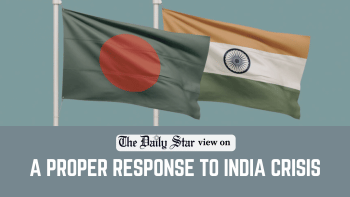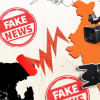Hasina’s claims are nothing but a distortion of facts

We strongly oppose the false narrative propagated by former Prime Minister Sheikh Hasina in her first public appearance—a virtual address at an event in New York—since fleeing Bangladesh following the July mass uprising. Her accusation that Chief Adviser Prof Muhammad Yunus is involved in perpetrating "genocide" clearly demonstrates that she is speaking from a place of vengeance, in total disregard for facts. In reality, it is Hasina who stands accused of being involved in mass murder during the uprising, along with numerous other grievous human rights violations committed during her 15 years of fascistic rule, for which there is substantial evidence. In her pursuit of vengeance against Prof Yunus, she has not only vilified him but also tarnished Bangladesh's image.
For instance, in her virtual address, she falsely claimed that Hindus, Buddhists, and Christians have been persecuted in large numbers in Bangladesh since her government was ousted. This blatant lie, initially spread on social media, is now being amplified in a coordinated effort by certain sections of the Indian media and political class. Echoing the narrative of those who have been systematically demonising Bangladesh recently, Hasina falsely claimed that Chinmoy Krishna Das, the former ISKCON leader, was arrested in response to Hindus protesting their persecution in the country. Ironically, many communal incidents occurred during her own rule which she failed to prevent or acknowledge.
Furthermore, Hasina stated that she had left the country to prevent further bloodshed when protesters were heading towards Ganabhaban. However, as this and other media outlets then reported, until her final moments in office, she made every effort to cling to power through the use of even more force, at the cost of spilling more blood. This was only prevented when the army refused to fire on the citizens.
Given the seriousness of the crimes she is accused of committing, we are disappointed that the Indian government, which gave her shelter, did not do more to prevent her from propagating such false narratives against Bangladesh's current government that emerged from a popular uprising. Moreover, the fact that her campaign to demonise Bangladesh is increasingly aligning with right-wing Indian media raises questions about whether India truly seeks "stable and constructive relations" with Bangladesh, as the Indian high commissioner recently asserted. This is particularly concerning given the ample evidence—such as leaked recordings of her phone calls—suggesting that Hasina has been trying to instigate and destabilise Bangladesh from New Delhi. In response, the Bangladeshi government—including its chief adviser—requested that its Indian counterpart prevent Hasina from carrying out such disruptive activities.
Yet, ignoring Bangladesh's request, the Indian government has not taken any substantial steps to dissuade the deposed former prime minister from spewing hateful rhetoric against Bangladesh. By doing so, how is India helping our bilateral relations? India should carefully consider how such decisions will affect its relationship with Bangladesh. We also hope the Indian media, instead of repeating Hasina's lies, portrays Bangladesh accurately in order to prevent harm to the relations between the two countries.


 For all latest news, follow The Daily Star's Google News channel.
For all latest news, follow The Daily Star's Google News channel. 











Comments